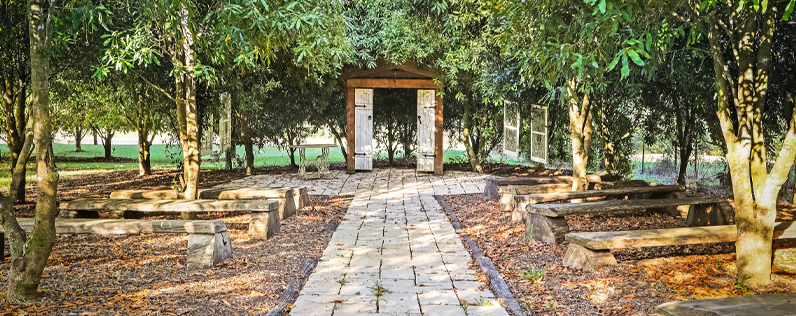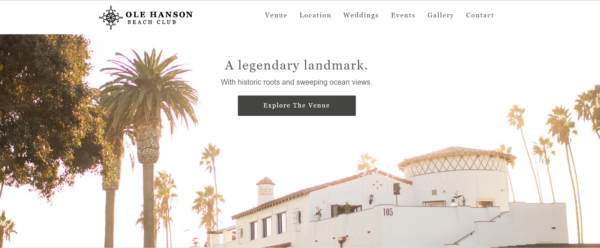
Drawing in potential customers is massively valuable to an event venue. So is building rapport with planners and vendors.
An effective venue marketing strategy can help you reach the right audience and expand your customer base efficiently. And while you should be adapting quickly to new norms and precautions in the event planning industry, a fresh and comprehensive marketing strategy for the future can highlight your hard work and the strengths of your venue as you move forward.
Ideally, marketing endeavors should have a positive impact on your business. To accomplish this, your plan should include a combination of outreach and promotion initiatives that target both event planners and customers. If you’re already doing that, then it’s time to take your venue marketing strategies to the next level.
In this article, you’ll learn to elevate your event marketing strategies by:
- Defining your target audience
- Updating your venue’s imagery
- Making the most of your website
- Keeping up with social media
- Crafting email marketing campaigns
- Encouraging customer reviews
- Using paid advertisements
Defining your target audience
Before diving into venue marketing strategy, you must determine exactly who your audience is. Among other factors, the particulars of your audience will be driven by:
- The type of venue you have
- Your venue’s location
- The accessibility of your venue
- Market trends
Your Ideal Customer
You can learn more about your audience by outlining your ideal customer and pinpointing the most profitable segments within that bigger group. Ask yourself:
- Who are your customers?
- What are their defining characteristics?
- Why do they need your venue?
- What do they enjoy about your venue?
- What makes your venue unique or special?
Broad and Specific Audiences
Identify two types of audiences that you may want to target using marketing:
- Your broad audience, or those who want to hold events at your venue and may appreciate services you offer
- Your specific audience, or those who will want to use your venue in a particular way and may need to work with you to figure out how you can accommodate their needs
It is important to market to both your broader and more niche audiences and convey your willingness to work with their needs. As you develop your marketing plans, consider creating different promotions, prices, or curated packages for each of your audiences.
Different Stages of the Customer Journey
Every member of your target audience is unique. Each one may be in vastly different stages of their research and booking journey. Keep this in mind while crafting your marketing plan. The knowledge will help you reach the most customers with the information that impacts them most directly.
For example: Content focused on the beauty, accessibility, and type of events hosted at your venue might appeal most to someone who is just beginning their search. Detailed outlines of packages and pricing would better serve a planner or customer who is deep into their venue-seeking process.
Updating your venue’s imagery
Much of your establishment’s appeal lies in its visual aesthetic. While it seems simple, don’t miss the opportunity to show off your venue with up-to-date images.
Use imagery consistently across all platforms — on your website, in ads, for social media marketing, and within email campaigns. Draw attention to new additions to your venue and to show off your space in its finest event-hosting moments.
You may want to invest in a professional photographer’s services to refresh your imagery and highlight the best things about your venue. Quality photography ensures that individual customers, companies, and event planners will take notice of all that your venue has to offer.

Making the most of your website
Your website can be a powerful component of your marketing strategy. Once you’ve updated the imagery on your website, make sure your site has high visibility. Maintaining your venue website should include:
- Search engine optimization (SEO): Implementing SEO earns your site more views naturally through well-placed keywords. Search optimization tools can help make SEO easy to understand and use.
- Mobile responsiveness: Your website should be up to date and work well on all mobile devices. This will garner more views and more interested customers.
- Photo and video content: Venue marketing is a highly visual endeavor. Show off your updated imagery through a photo-focused website or content like virtual walkthroughs.
Keeping up with social media
Social media marketing is the most immediate way to get information about your venue to potential customers. It can also help you position your venue within your target market.
Social media is a great way to interact in a personalized way with your potential customers. Give your venue a unique voice by utilizing platforms that cater to your audience:
- Facebook is newsfeed-focused and effective for building personal connections.
- LinkedIn is a professional setting that’s great for business to business interactions like connecting with vendors or event planners.
- Instagram is visually driven and perfect for showing off your gorgeous venue.
- Pinterest is an excellent niche platform for sharing tips and ideas about how to style your venue — depending on your market.
If you are not confident about social media, don’t worry. Social media marketing is about focusing on nurturing relationships on one or two primary platforms. Have fun with creating a distinct voice and aesthetic before branching out to additional platforms.
Crafting email marketing campaigns
Email marketing is an essential component of your venue marketing strategy. It is an impactful way to engage with your target audience over time.
Email campaign content ideas
Arts and culture email campaigns that you run for your business should align with and enhance your other marketing endeavors. Successful email campaigns should highlight:
- New offerings on your website or social media
- Recent or upcoming events
- Scheduled promotions
- Planned closures or renovations
- Any important updates or new safety measures
Ways to boost email engagement
A great way to further personalize your email campaigns is through segmentation. With segmentation, you can adjust your content to appeal to planners, while simultaneously sending out a customer-focused campaign.
Paired with segmentation, tracking your readership and using A/B testing can help you develop a fresh and effective marketing plan that evolves with trends, the times, and your customers.
Meaningful and timely newsletters
A great way to utilize email in a meaningful way is through email newsletters. Creating a dynamic and timely newsletter can help you stay fresh in the minds of past and prospective clients. These people may be interested in day-to-day activities at your venue.
Once you have created your newsletter using a template, you can use tools such as Constant Contact’s email marketing automation to help you keep up with all segments of your audience consistently.
Encouraging customer reviews
In an industry that is often driven by word-of-mouth recommendations, managing listings and reviews can prove to be an effective part of your marketing strategy. Using the voices of your satisfied customers is an excellent way to build your reputation and garner interest in your venue.
Encourage customers to review and publish accounts of their great experiences at your venue and with the unique services you offer. They can publish reputable reviews on several sites but two, in particular, offer a wide and relevant reach for venues:
- Customers tend to turn to Google most often and trust the information they find there. Use Google reviews to drive bookings and business.
- Yelp casts a wide net in terms of what types of services are included but is effective for attracting new followers on social media and new traffic to your site.
Asking customers for reviews is a great way to establish rapport with existing clients and nurture credibility with potential customers. Many planners research potential venues by checking reviews and are likely to be willing to provide an account of their own experiences, too.
Using paid advertisements
Ads may seem cliche but they are effective for drawing more traffic to your site and converting them to customers. Create ads that are specific to your unique venue and link directly to your landing page.
Facebook and Instagram ads
Social media platforms have a wide reach, and running advertisements on them could be a powerful tool to add to your marketing efforts. While having your own platform is effective, using targeted ads will elevate their efficacy. You can target these ads based on common connections, behaviors, interests, demographics, and location.
Google Ads
What’s great about Google Ads is that they show up on daily searches for goods and services. You can pay to be advertised at the top of search results or via text ads. These advertisements are particularly effective because they can quickly capture the attention of potential customers who are actively looking for a venue like yours.
Key takeaways
Now that you understand the importance of knowing your audience, keeping your imagery fresh, maximizing your website, being on social media, executing email campaigns, and paying for ads, are you ready to create your venue marketing strategy?
Check out Constant Contact’s The Download — a free marketing guide for people in your industry that shows how all these marketing elements can come together to put your venue’s best foot forward. A brighter future for your venue is just a few steps away!




